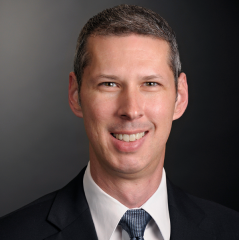License to thrive: Arizona bill would allow reciprocity for regulated professions

Editor's note: This story is being highlighted in ASU Now's year in review. Read more top stories from 2019.
The Arizona Legislature recently passed HB 2569, a bill that would loosen occupational licensing laws in the state by recognizing out-of-state licenses as valid. Gov. Doug Ducey has been a vocal supporter of universal licensing recognition, suggesting that a person’s skills don’t diminish when they cross state lines, and the change will allow those who have moved from other states to “work faster and without all the red tape.”
To better understand the role of occupational licensing and what this change would mean for Arizona’s businesses and residents, ASU Now spoke with Stephen Slivinski, senior research fellow at the Center for the Study of Economic Liberty at Arizona State University.
Question: What is occupational licensing? What kinds of jobs in Arizona require a license?

Stephen Slivinski
Answer: Occupational licensing laws — which are state-specific laws that vary by state — require workers in certain occupations to first obtain a license from a government licensing board before they can hold a job in that field. Not all occupations in Arizona require a license, but many do.
The requirements to obtain a license vary by occupation and state, and generally consist of meeting a minimum number of training hours and paying a fee. Some licenses may require a specific degree, like a high school diploma or a college degree, or an apprentice period with an existing license holder. All states license doctors and lawyers, for instance, but not all states require a license for occupations like interior designer or animal breeder (and yes, some states do).
Currently, Arizona ranks as having one of the top five most burdensome licensing requirements in the nation overall, both in the number of occupations that are licensed and the number of training hours required. These burdens hit low-income workers the hardest: Over 65% of low-income occupations in Arizona require a license, and those jobs have some of the heaviest financial and training-based requirements when compared to other states.
Q: What would this bill do?
A: This bill would allow anyone with an existing license from another state — in good standing — to have instant reciprocity with Arizona. In other words, they would receive a “seal of approval” from the state of Arizona once they establish residency in the state, without having to take an Arizona licensing exam or logging the prescribed hours of training.
The bill does allow the state to decline this right of reciprocity for a disqualifying criminal history. Certain occupations would not be granted instant reciprocity, including those that require a security clearance.
Q: Will granting reciprocity weaken the ability of the state to protect consumers?
A: These laws are often justified on the basis that the state has a compelling interest in protecting consumers and citizens from “bad actors” or safeguarding public health. However, there is a consensus among economists and scholars that these requirements often do not line up with the actual risk to public health and safety. Barbers in Arizona, for instance, are required to log over 1,000 hours of training before they receive a license, while emergency medical technicians have to log 110 hours.
Academic studies have also found no significant difference in public health and safety outcomes in states that have higher licensing burdens when compared to those that are closer to the national average.
Q: What are the advantages to reciprocity?
A: The main advantage of license reciprocity is increased competition in licensed service sectors and, therefore, more choices and lower prices for consumers. It also makes Arizona instantly more attractive to workers and entrepreneurs already looking to relocate to Arizona to take advantage of our other competitive advantages, like climate and cost of living.
Studies indicate that interstate mobility — the likelihood that someone will relocate to another state to find work — is greatly reduced when licensing processes are perceived to be burdensome. Moreover, current Arizona residents who have avoided working in a particular field because their license is from another state can now work in a field that previously seemed off-limits. This sort of reform will have benefits to workers and employers as well as consumers.
Q: Do you expect this bill will encourage other states to grant licensing reciprocity? Will this become a trend?
A: I think this change will make Arizona instantly more attractive for workers and employers looking to relocate out of their current state. If this proves to be a compelling reason for people to relocate, it is very likely that other states will follow suit to try to gain a competitive edge. The Arizona reform is the first-of-its-kind in the nation so we will need to wait and see how this all plays out.
Views expressed in this interview belong solely to the professor, and not necessarily to the university.
More Law, journalism and politics
Can elections results be counted quickly yet reliably?
Election results that are released as quickly as the public demands but are reliable enough to earn wide acceptance may not always be possible.At least that's what a bipartisan panel of elections…
Spring break trip to Hawaiʻi provides insight into Indigenous law
A group of Arizona State University law students spent a week in Hawaiʻi for spring break. And while they did take in some of the sites, sounds and tastes of the tropical destination, the trip…

LA journalists and officials gather to connect and salute fire coverage
Recognition of Los Angeles-area media coverage of the region’s January wildfires was the primary message as hundreds gathered at ASU California Center Broadway for an annual convening of journalists…

